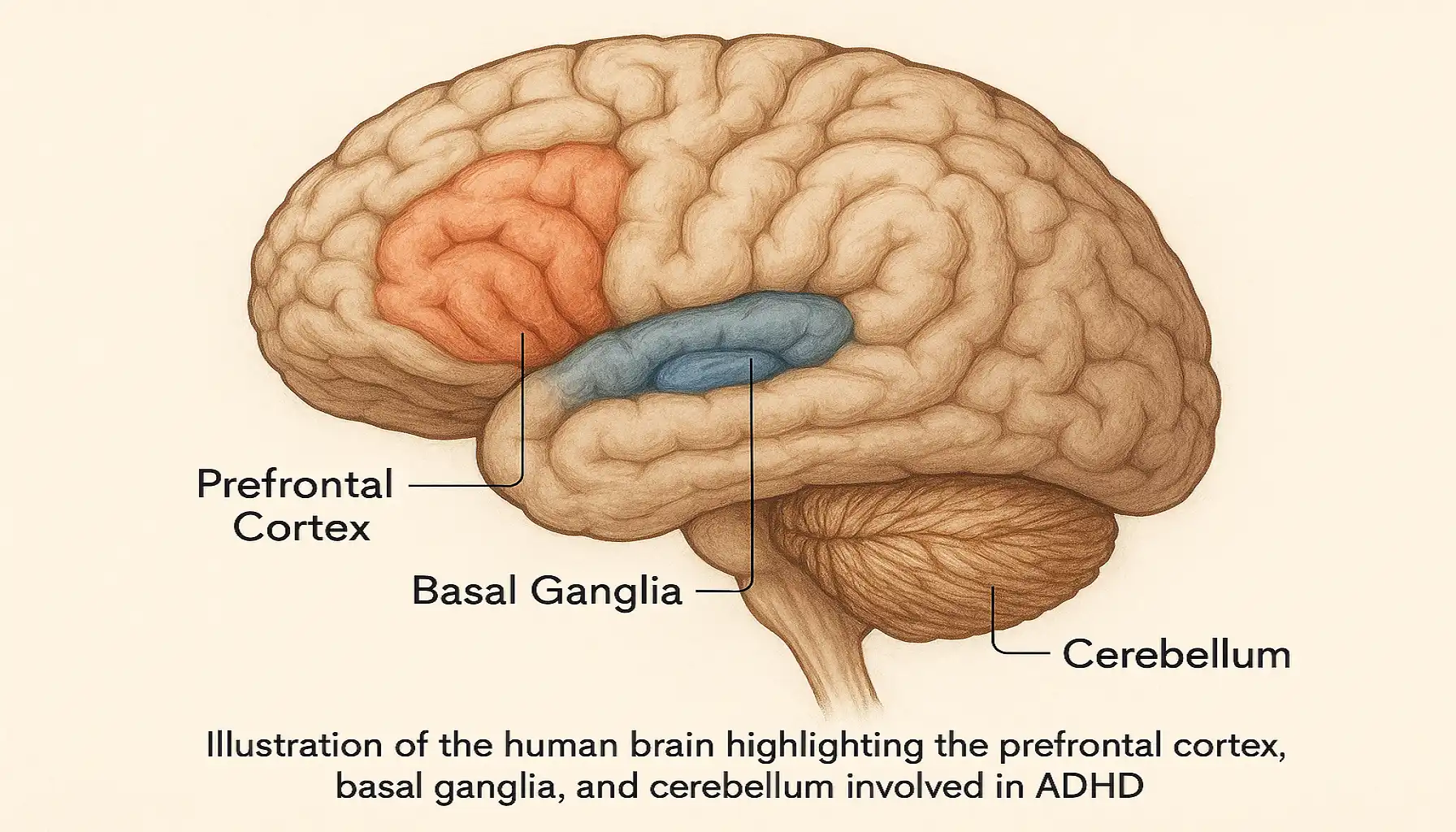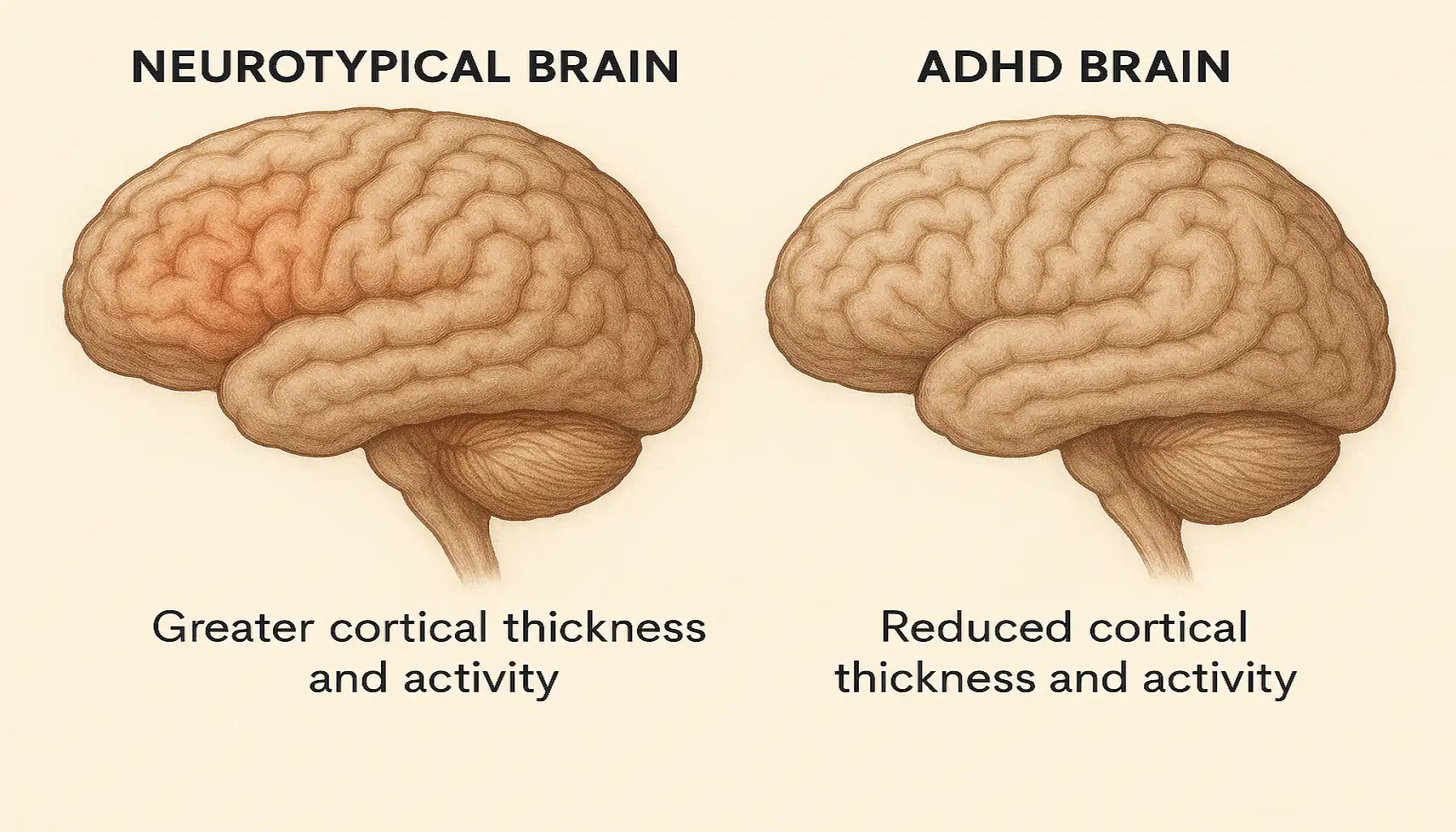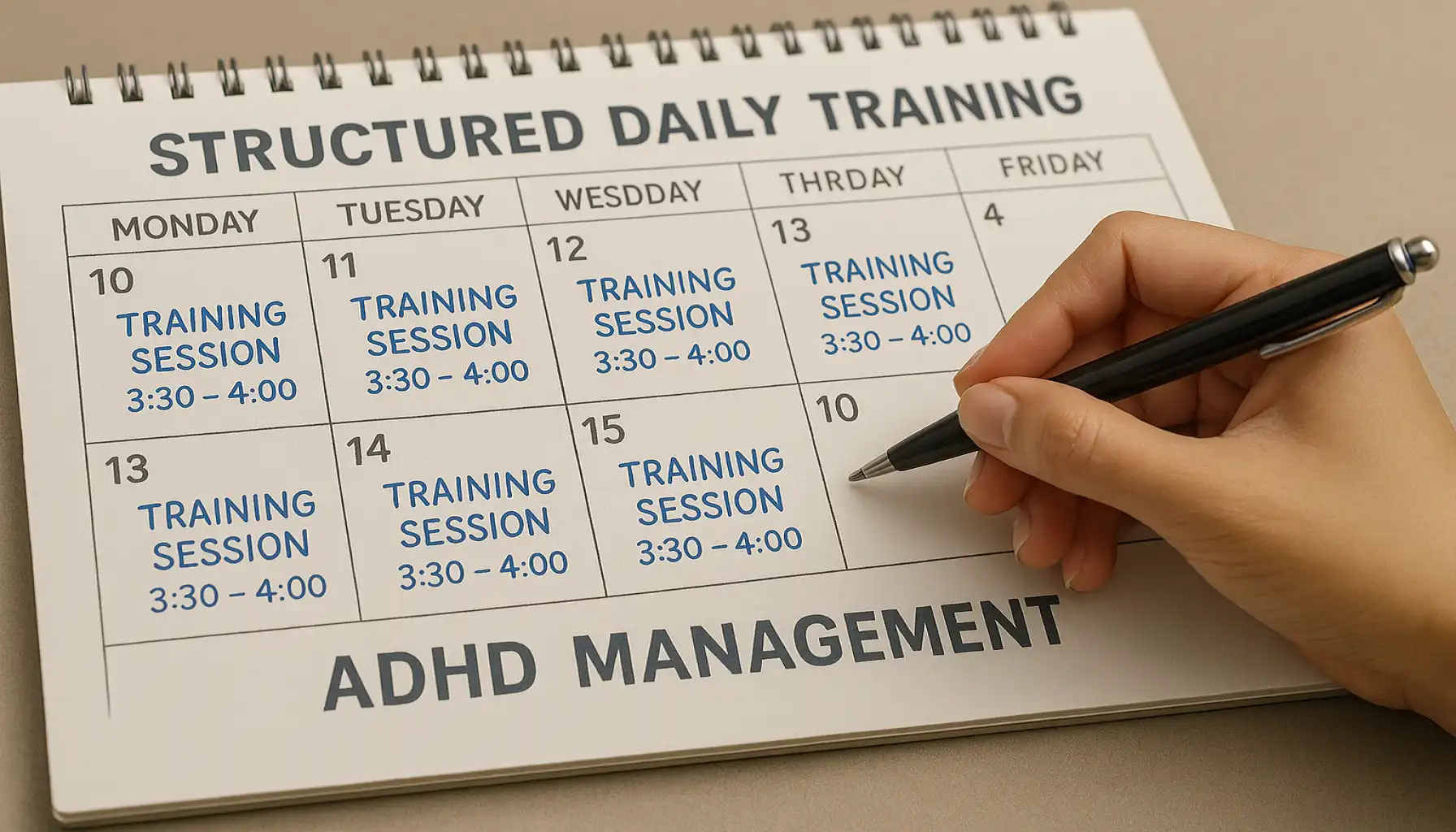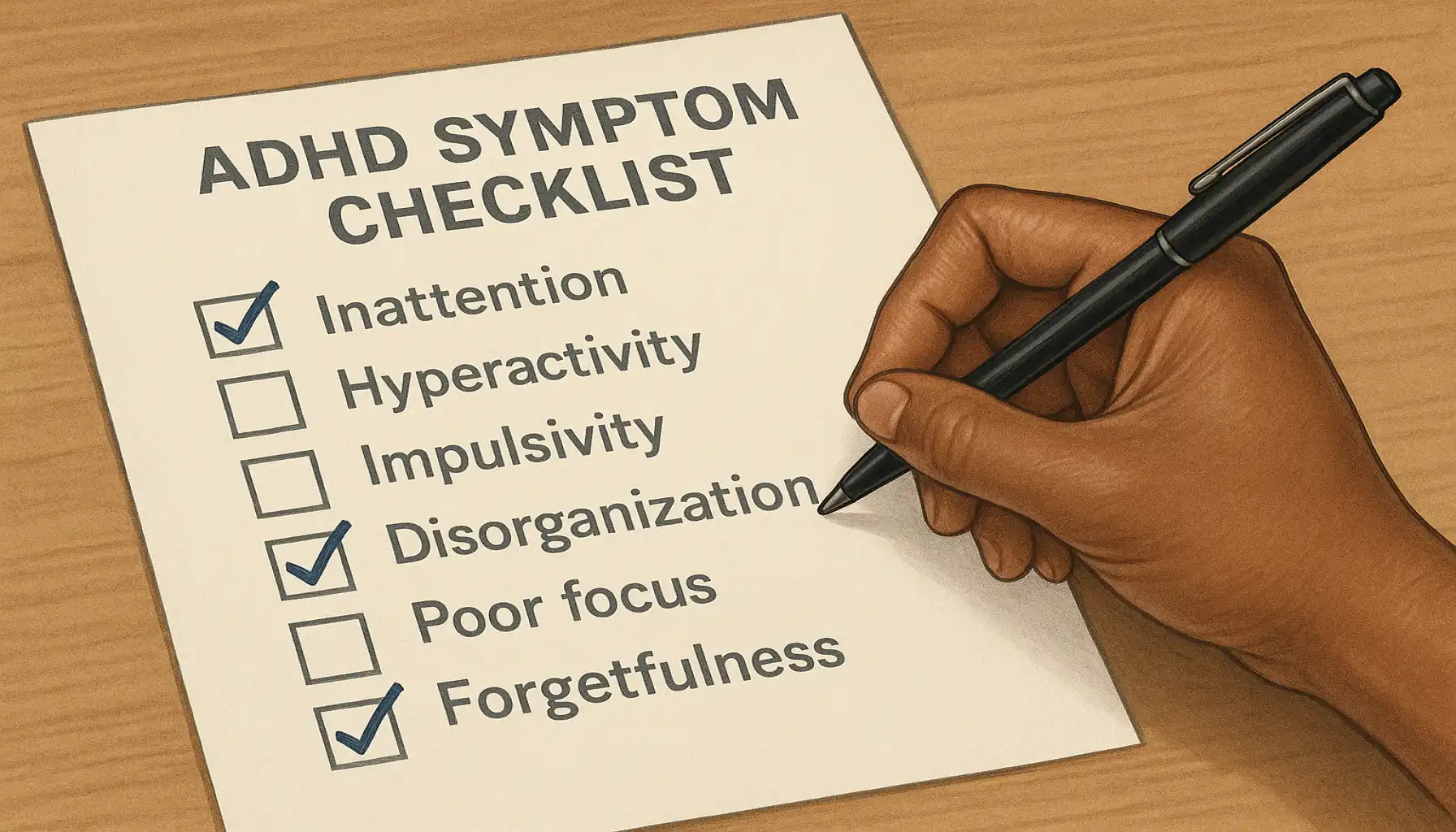Could You Have Adult ADHD? The Overlooked Signs

Contents:
ADHD is a chronic neurodevelopmental disorder characterized by functional impairments in executive functioning, particularly in attention regulation, impulse control, and activity modulation.
It’s associated with structural and functional abnormalities in the prefrontal cortex, basal ganglia, anterior cingulate cortex, and cerebellum — all of which are involved in regulating attention, behavior, and executive control.
Reduced cortical thickness in frontal brain regions (brain testing needed)
Delayed cortical maturation compared to neurotypical individuals
Dysregulation of catecholamine neurotransmitters

Etiology
ADHD symptoms in adult women and men are multifactorial, with contributions from:
Genetics:
Heritability is estimated at 70–80%
Involves multiple genes related to dopamine transport and receptor function (e.g., DRD4, DAT1)
Prenatal and Perinatal Factors:
Maternal smoking, alcohol exposure
Premature birth, low birth weight
Lead exposure or hypoxia
Environmental & Psychosocial Influences:
Early trauma or chronic stress
Family dysfunction may exacerbate symptoms, but does not cause ADHD
Adult ADHD Symptoms and Medication
1. Pharmacologic
Stimulants (first-line): Methylphenidate, amphetamines
Non-stimulants: Atomoxetine, guanfacine, clonidine
2. Behavioral & Cognitive Interventions
CBT for ADHD: Targets executive dysfunction and emotional regulation
Psychoeducation, coaching, environmental structuring

Adult ADHD Symptoms Women
ADHD in women is frequently underrecognized due to internalized symptoms, social masking, and overlap with mood or anxiety disorders.
Cognitive & Executive Dysfunction Symptoms of ADHD in Adult Women
Chronic forgetfulness (names, dates, tasks)
Disorganization in daily life (home, work, digital clutter)
Difficulty starting or completing tasks
Poor time awareness and procrastination
Trouble maintaining attention in conversations or reading
Emotional Dysregulation ADHD in Adult Women Symptoms
Intense emotional reactions to small setbacks
Mood instability or rapid shifts without clear triggers
Overwhelm in busy or stimulating environments
Rejection Sensitivity Dysphoria (RSD) — emotional distress from perceived criticism
Persistent low self-esteem, guilt, or shame

Impulsivity ADHD Symptoms Adult Women
Verbal: Interrupting, oversharing, blurting out thoughts
Emotional: Reacting without pause, emotional impulsiveness
Behavioral: Impulse shopping, overcommitting, risky decisions
Hyperactivity Adult Women ADHD Symptoms
Mental restlessness or “busy brain”
Constant multitasking, rarely finishing anything fully
Physical fidgeting (nail-biting, leg bouncing, tapping)
Inability to relax or enjoy stillness
Masking & Overcompensation ADHD Adult Women Symptoms
Perfectionism to cover symptoms
People-pleasing or emotional suppression to “blend in”
Appears high-functioning externally, exhausted internally
Feels like always working harder than others just to “keep up”
Common Misdiagnosis of Adult Female ADHD Symptoms
Anxiety disorders
Depression
Bipolar II disorder
Borderline Personality Disorder (BPD)
PMDD (Premenstrual Dysphoric Disorder)

Adult ADHD Symptoms Men
Men with ADHD tend to show more externalized and visible symptoms, often leading to earlier diagnosis but also increased risk for behavioral mislabeling or social consequences.
Hyperactivity & Restlessness Symptoms of ADHD in Adult Men
Physical fidgeting, pacing, or difficulty staying still
Feels “driven by a motor” — constant need for activity
Talks excessively or dominates conversations
Impatience in queues, meetings, or group settings
Impulsivity ADHD in Adult Men Symptoms
Frequent interrupting or blurting without thinking
Quick decisions without weighing consequences (e.g., financial, relational)
Risk-taking behaviors (speeding, unsafe sex, substance use)
Difficulty delaying gratification

Inattention & Distraction ADHD Symptoms Adult Men
Trouble focusing on details or following through on instructions
Frequently misplaces items or forgets deadlines
Starts projects enthusiastically but rarely completes them
Easily distracted by noise, movement, or internal thoughts
Emotional Regulation Adult Male ADHD Symptoms
Frustration and irritability over minor issues
Low tolerance for stress or slow progress
Outbursts of anger followed by regret
May struggle to identify or express emotional states
Functional Impairment ADHD Symptoms in Adult Males
Chronic underperformance at work despite intelligence or skill
Relationship instability due to irritability, impulsivity, or poor listening
Frequent job or career changes (“boredom” or difficulty with structure)
Legal or disciplinary issues from impulsive behavior
Common Misinterpretations of Symptoms of Adult ADHD in Men
Labeled as lazy, rebellious, or immature rather than recognized as neurodivergent
Often self-medicates with alcohol, cannabis, or stimulants
Co-morbidities include substance use disorder, depression, and ODD (in younger males)

Symptoms of Adult ADHD in Women and Men Comparison
Aspect | ADHD Adult Symptoms Women | ADHD Symptoms in Adult Men |
Core Type | More often Inattentive or Combined | More often Hyperactive-Impulsive or Combined |
Hyperactivity | Internal (mental restlessness) | External (fidgeting, movement, talking) |
Impulsivity | Emotional or verbal (oversharing) | Behavioral (risky actions, interrupting) |
Inattention | Spacy, disorganized, forgetful | Distracted, unfocused, poor follow-through |
Emotional Symptoms | Rejection sensitivity, anxiety, low self-esteem | Irritability, frustration, emotional outbursts |
Masking | High: perfectionism, people-pleasing | Low: symptoms more openly expressed |
What Are the Symptoms of Adult ADHD? 21 Common Signs That Doctors Often Miss
Cognitive & Attention-Related Signs and Symptoms of Adult ADHD
Frequent mental fog → You often feel like your brain is cloudy, zoning out during tasks or conversations.
Chronic disorganization → Your physical and digital spaces are cluttered; managing details feels like a losing battle.
Trouble finishing tasks → You start projects with motivation but leave many half-done — even ones you enjoy.
Short attention span for routine work → You avoid boring or repetitive tasks like bills, forms, or cleaning, even if they’re important.
Procrastination driven by mental overload → You delay tasks not out of laziness, but because they feel too overwhelming to start.
Forgetfulness in daily life → You regularly forget appointments, birthdays, conversations, or where you put things.
Difficulty processing long instructions → You lose focus during long conversations, meetings, or reading assignments.

Emotional & Psychological Signs and Adult Symptoms of ADHD
Emotional overreactions → Small events trigger big emotional responses — frustration, shame, or sadness.
Rejection Sensitivity (RSD) → Even gentle criticism can feel like a personal attack, leading to withdrawal or self-blame.
Low frustration tolerance → Waiting in line, traffic, or multitasking can provoke irritability or restlessness.
Chronic self-doubt or low self-esteem → You often feel “behind,” compare yourself to others, and believe you're underperforming.
Perfectionism as compensation → You try to appear in control by doing everything “just right,” leading to burnout.
Shame around inconsistency → You feel guilty for being unreliable — forgetting things, missing deadlines, or zoning out.
Social & Behavioral Signs and ADHD Symptoms as an Adult
Interrupting or speaking impulsively → You often talk over others, blurt things out, or derail conversations without meaning to.
Impulsive decisions → You make quick choices — spending, quitting jobs, starting new hobbies — without planning.
Social fatigue or masking → You "perform" in social settings but feel drained and disconnected afterward.
Disappearing from social circles → You lose touch with friends not from lack of care, but from mental disorganization.
Overpromising, underdelivering → You agree to plans or projects but struggle to follow through, then feel ashamed.

Life Impact Signs and Male and Female Adult ADHD Symptoms
Constant feeling of underachievement → Despite intelligence or effort, you feel like you’re not living up to your potential.
Time blindness → You underestimate how long things take, often run late, or hyperfocus and lose hours.
Daily life feels harder than it should → You watch others manage basic responsibilities with ease while you feel constantly overwhelmed.
Adult ADHD Symptoms Test

For each statement, check the box if it describes your experience often or very often in the past 6+ months.
Section 1: Inattention
Section 2: Hyperactivity / Impulsivity
Section 3: Emotional & Functional Impact
Scoring Adult ADHD Symptoms Checklist:
0–6: Unlikely ADHD, but symptoms may stem from stress or another issue
7–13: Moderate ADHD traits — consider tracking patterns or lifestyle factors
14–21: Strong ADHD profile — clinical evaluation is highly recommended
Note: This tool is not a diagnostic test, but a self-screening aid. If your score is high or the symptoms feel familiar, consult a licensed psychologist, psychiatrist, or neurologist for a full assessment and further treatment.
Symptoms Adult ADHD

“People with ADHD have a Ferrari engine for a brain, but with bicycle brakes. Strengthening the brakes is the secret to success.” — Dr. Edward M. Hallowell, M.D., Psychiatrist, co-author of Driven to Distraction
How Mind Elevate copes with adult men and adult woman ADHD symptoms:
Cognitive Training: 35+ games improve focus, working memory, and impulse control
Executive Function Boost: Helps with time management, attention, and mental clarity
Short Sessions: Easy to stick with — 5 to 20 minutes a day





